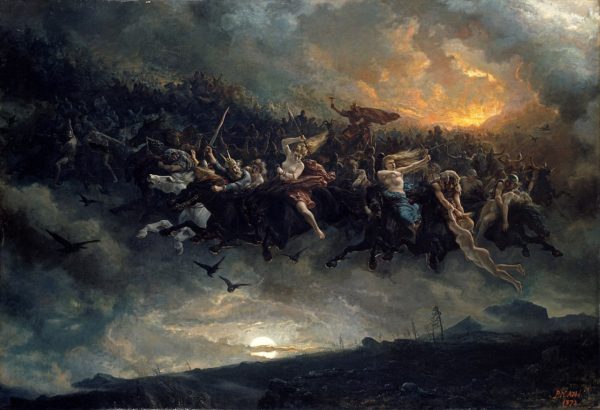
Walpurgisnacht is known in the Germanic countries of central Europe as a night when the dead walk the earth, when witches and fairies roam about, and the division between the worlds of living and those of the dead are thin. Falling six months from Halloween, Walpurgisnacht shares many of its attributes.
Saint Walpurga
Walpurga was born, and became a nun, in England before traveling to assist her brother, Saint Boniface, in evangelizing the Germans. When Boniface died, Walpurga became abbess of the Heidenheim am Hahnenkamm monastery he established there. Saint Walburga is often depicted in stone carving and pictures as being accompanied by a dog. There is little in her autobiography to account for this faithful companion, but there is plenty of historic associations of dogs with other Germanic goddesses like the Norns and Friga, a Goddess of May Day and the Wild Hunt. This is just one way that the Saint and Goddess have been woven together through time. Saint Walburga’s tomb was also said to start weeping a miraculous healing oil on the first of May. Though the church would try and downplay the association of the oil and saint with Mayday, the connection would remain in people’s minds.
Goddess Walpurga
Walpurga, or Walburga, is all white and gold. She is a fertility goddess, a forest goddess, and a goddess of springs. She is associated with grain and the harvest, and like Berchta she has a spindle. With her she carries a unique three cornered mirror that shows the future. She has been compared to Holda, also keeper of a spindle, goddess of fertility, and sharing a tendency to reward her followers with gifts of gold. She has also been compared to Brigid, who shares her May holiday and her double life as saint and goddess.
Wild Hunt
When the sun sets on the 31st of April a storm of spirits rips through the sky, making mischief through every town in it’s path. Is Odin the leader of the Wild Hunt, atop his six legged steed, or was it Perchta, or Holda? In Scotland the Wild Hunt is made up of the Sluagh or Unseelie Court, joined by any restless spirit that did not feel much like leaving the physical world.
Walpurga has been linked to the Wild Hunt as well. Yet, different from the many spirits who might do you a trick if found in their path, Walpurga is pursued. She runs from the tumult, flying from village to village in a desperate attempt to find a hiding place. It is said that if you leave your window open, so she can hide behind the cross of the windowpane grill, she will leave you gold as thanks.
Readings:
- Hodge, Winifred (nd) Waelburga and the Rites of May. https://www.friggasweb.org/walburga.html
- (nd) Pagan Holidays; Walpurgis Night and how a British lady went from Cathololic saint, to Germanic goddess, to witch and gave us a second Halloween. Wytchery: a gothic curiosity cabinet. https://www.gothichorrorstories.com/pagans-and-heathens/pagan-holidays-walpurgis-night-and-how-a-british-lady-went-from-catholic-saint-to-germanic-goddess-to-witch-and-gave-us-a-second-halloween/
- Wikipedia (2019) Wild Hunt. https://en.wikipedia.org/wiki/Wild_Hunt
- Wikipedia (2019) Saint Walpurga. https://en.m.wikipedia.org/wiki/Saint_Walpurga
